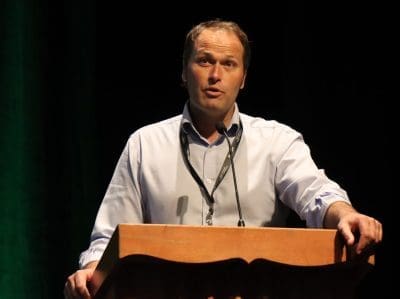The theat of foot and mouth disease in Indonesia means now is the time to address long term shortfalls in biosecurity funding once and for all, National Farmers Federation vice-president David Jochinke told this morning’s National Fodder Industry conference in Toowoomba.
Invoking the aphorism that you should “never let a crisis go to waste”, he said agricultural leaders are working hard to ensure the opportunity is not lost to finally address long-running short-falls in biosecurity funding.
An outbreak in Australia would be catastrophic for many in Australian agriculture, including the many hay producers present at today’s AFIA conference, given the direct impacts it would have on the livestock sector, Mr Jochinke said.

NFF deputy president David Jochinke addressing this morning’s National Fodder Conference hosted by the Australian Fodder Industry Association (AFIA) in Toowoomba.
“Biosecurity is the biggest thing that is keeping us absolutely flat out at the moment,” Mr Jochinke told the conference.
“I have never seen anything like it my time in agri representation, and it is only been because it got to Bali.”
He said biosecurity will become more and more important in Australia, yet it remains “systemically underfunded”.
The NFF’s view is that adequate funding for biosecurity must be locked in on a long term and sustainable basis, and not be allowed to move around based on political terms.
“We’re trying to expose the funding system that hasn’t been put in place, the fact that multiple governments, not just the current one or the past one or the one before that, have not put in place a sustainable model,” he said.
The amount of trade, mail and passenger traffic coming into Australia has increased by 15-20% yet biosecurity funding has not increased by the same rate, he said.
“So how are we meant to check all of the mail? How are we meant to check all of the imports and all of the tourists coming through, when we don’t have the funding system in place?”
He said the NFF was working with the Government both more verbally in public and behind the scenes to ensure biosecurity funding is front and centre.
It is also asking for 100 percent screening of passengers returning from disease hotspots, foot baths and “more surveillance of everything that comes into the country”.
He said closing the border was a last lever after other options had been exhausted.
“If we haven’t demonstrated that we have tried to assist Indonesia as much as possible to get rid of the risk that is on our doorstep – there has always been a risk with Vietnam, Nepal, South Africa, even India, these are places that have had FMD before for a very long time and our biosecurity systems have been robust enough to keep it out.
“But the focus and the ability for us now to make sure we are getting longer lasting changes to our biosecurity screening systems shouldn’t’ be wasted.
“That cuts both ways and that is one of the reasons why we are not asking for that lever to be pulled yet, but it is still on the table if and when we need it.”
‘Wet paper towel fines’ must end
A delegate from the floor pointed out that border security shows on television often showed biosecurity offenders receiving very modest fines.
In response Mr Jochinke agreed that much stronger fines than the “wet paper towel you see on those tv shows” was needed.
“Massive fines that actually affect your equity position, these are the things we want to see.”
Additionally, biosecurity declaration forms travellers fill out when arriving in Australia must be treated as legal documents “that hold a lot of gravitas”.
“We are sharply focused on pushing the agenda of more conseuqnece for bad behaviour,” he said.

HAVE YOUR SAY